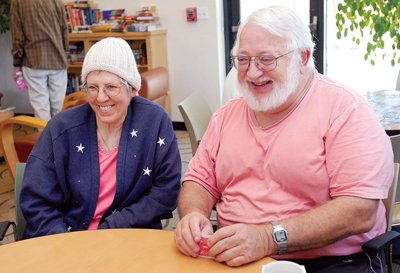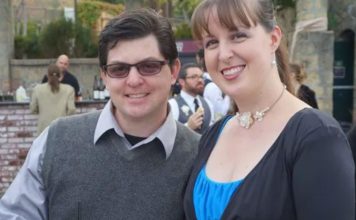This is a love story. It also is a tale of frustration,
compassion and learning to accept what you can’t change. John
Camisa, 70, is a full-time caregiver for his wife, Bonnie, 66, a
triple cancer survivor.
By Peggy Thompson, Special to the Dispatch
This is a love story. It also is a tale of frustration, compassion and learning to accept what you can’t change. John Camisa, 70, is a full-time caregiver for his wife, Bonnie, 66, a triple cancer survivor.
John is a burly guy, with a congenial and gracious personality, plus a halo of white hair and a carefully trimmed beard. Bonnie has a lovely smile, is immaculately dressed, slender and, once in a while, hesitatingly adds to the conversation. The breast cancer experience, two brain tumors and extensive surgery, have caused paralysis of her left side. Once an avid reader, it now takes her at least a half hour to work through a large print page. Her reading level is approximately fourth grade. Bonnie also has a moderate hearing and short term memory loss.
So, how does John manage? Bonnie is able to communicate, on a limited level, and can dress herself with help. They entered the Morgan Hill Senior Center recently, both shuffling behind walkers. Bonnie recently graduated from a wheelchair to the walker, but John injured his back placing the wheelchair in his car, so to protect his back he now uses the walker; the wheelchair is history.
Residents of Morgan Hill since 1977, the couple still live in the same house in which they raised their three children. John is a native of New Jersey; Bonnie hails from Weed. They married a year after meeting on a blind date and eventually had two sons and one daughter; “Absolutely fabulous in spite of us,” he chuckles.
He serves as coach, cheerleader and team manager in this partnership. John says that he does 97 percent of the cooking. At this point, Bonnie murmurs, “Spaghetti.” He explains that while he used to make his own sauce, why bother? “Prego can’t be beat.” And if you need recipes for the annual overload of zucchini, John has answers. A soup, served hot or cold or a terrific Lebanese-based recipe for squash stuffed with ground lamb, rice and cinnamon are on his menu. A few years ago, he had a large vegetable garden. Now he counts on fresh produce from one of their sons.
What about housework? Periodic household help keeps the dust bunnies under control. John manages the laundry and the laundry room is located on the lower level of the two-level house. He encourages Bonnie to tackle the stairs, up and down, at least three times daily.
This activity is a reflection of his “Water Faucet Principle of Life.” John explains that often one enters a public bathroom, squirts the soap and turns the cold water tap. The tap doesn’t work; neither does the hot. “Gunk in hands.” So, back to the cold tap and turn the faucet in the other direction. Bingo – water is too hot. “Some jackass messed up the plumbing.” In dealing with Bonnie’s disabilities, John tries to use a side or back door instead of the obvious approach. “Expect the unexpected; do something different.” He encourages her do chores by herself, instead of always doing for her.
“It’s tough,” he says, “to have to accept that you can’t fix the other person.” Her subdued response, according to John, is try not to fix me, listen to me and be compassionate. John says that he is not depressed by his wife’s condition, but often feels frustrated – especially with her short term memory loss. He tries to not give direct answers to her questions because she often forgets the day of the week and will continue to ask about the same event.
He praises the Gavilan Adaptive Physical Therapy sessions as being exceptionally beneficial for Bonnie. She enjoys both pool and dry land exercise, always supervised by a leader and staff members. Working on a treadmill has reduced her tendency to shuffle.
John has a couple of suggestions for other caregivers: don’t be afraid to ask for help. He says that we like to think we can do it all and don’t ask, “It’s a lesson in humility.” Also important, in his experience as a caregiver, is to listen if you can’t fix, accept where you are and know where you want to go.
One place where they both want to go is the Morgan Hill Senior Center, where they find stimulation and stay connected, share good news and bad and are warned of elder fraud and gang scams. John says the center is so important in their lives; he particularly enjoys the computer classes. They also are faithful bridge players, and he supports her attempts to play the complex game.
Denise Melroy, interim director of senior programs and services at the senior center, that socialization happens at the center and often makes a difference in peoples lives. The center is a safe haven for older citizens and served 1,700 people with between 30 to 40 programs in 2009. Recent budget cuts reduced the paid staff; severe cutbacks threatened reduction of senior center activities which were saved by a one time $25,000 grant from the Mt. Madonna YMCA. A Senior Task Force is being designed to explore a feasible solution for sustaining the senior center for the future.
A future that includes, among many other Morgan Hill seniors, John and Bonnie Camisa.













